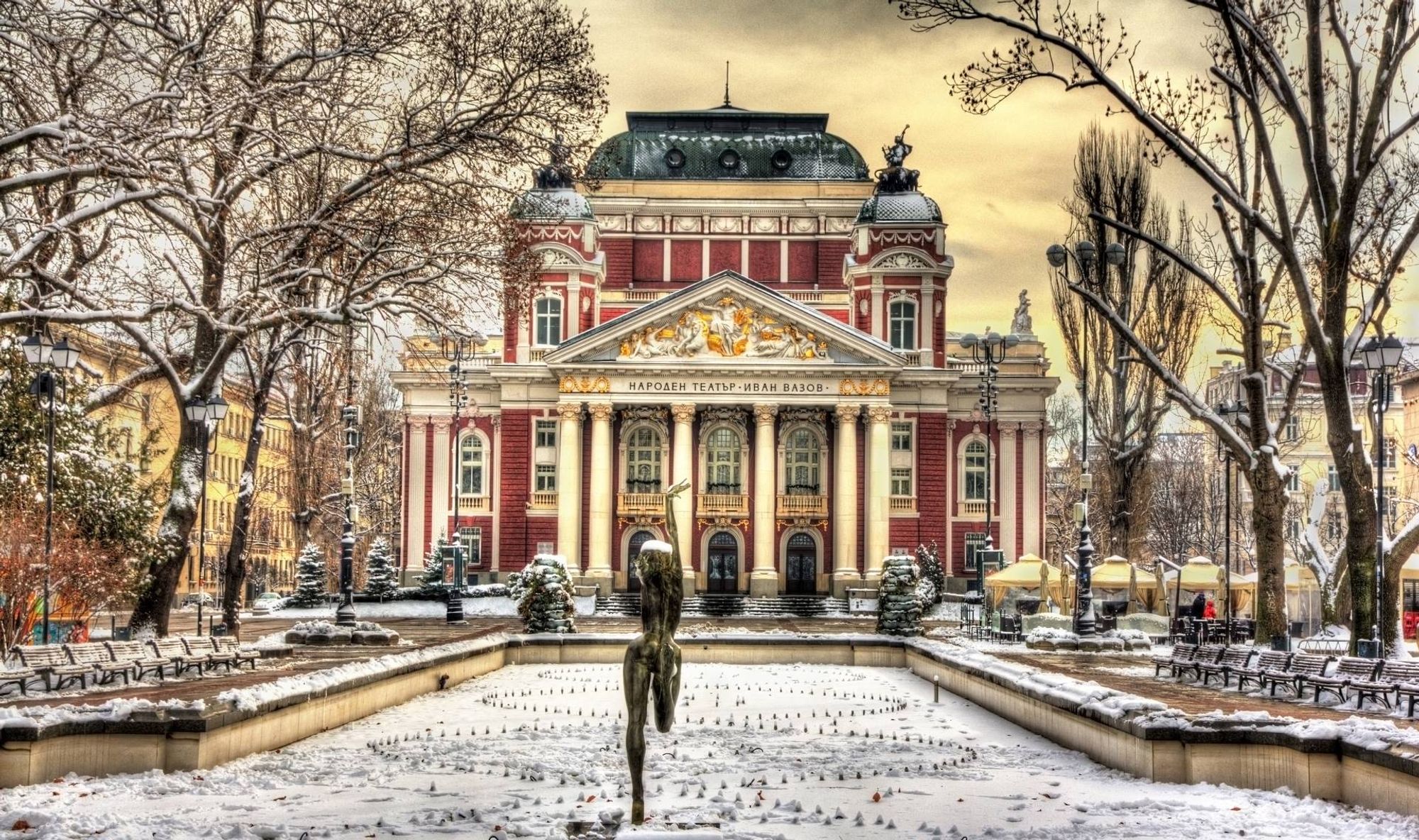- Book online with local operators
- We're here for you 24/7
- Stories by travelers, for travelers
Are you leaving or arriving to Sofia?
Bansko to Sofia
Istanbul to Sofia
Plovdiv to Sofia
Edirne to Sofia
Borovets to Sofia
Razlog to Sofia
Varna to Sofia
Bremen to Sofia
Skopje to Sofia
Madrid to Sofia
Rila Monastery to Sofia
Berlin to Sofia
Pleven to Sofia
Veliko Tarnovo to Sofia
Budapest to Sofia
Samokov to Sofia
Dobrich to Sofia
Thessaloniki to Sofia
Brno to Sofia
Pirot to Sofia
Dusseldorf to Sofia
Bucharest to Sofia
Pomorie to Sofia
Shumen to Sofia
Tirana to Sofia
Burgas to Sofia
Stara Zagora to Sofia
Belgrade to Sofia
Yambol to Sofia
Dimitrovgrad to Sofia
Sunny Beach to Sofia
Kardzhali to Sofia
Athens to Sofia
Pazardzhik to Sofia
Stations in Sofia
About city Sofia
Traveler Guide to Sofia, Bulgaria
Sofia, the capital of Bulgaria, combines its historical heritage with contemporary life. The city has been around for thousands of years and draws visitors with ancient ruins and landmarks such as the famous 4th-century St. George Rotunda. Besides these historic sites, Sofia is filled with lively cultural activities including arts festivals, music events, and museums that showcase both traditional and contemporary artworks. Sofia is more than a center for culture and history. It also provides modern amenities like trendy cafes, active markets, and green areas such as Borisova Gradina where locals and tourists can relax and enjoy the local atmosphere. Moreover, it serves as a starting point for exploring Bulgaria's picturesque mountain areas that attract hikers and skiers. Sofia appeals to a wide range of travelers because it offers numerous experiences. From history buffs interested in exploring ancient times to outdoor enthusiasts ready to climb Vitosha Mountain’s slopes, Sofia has something for everyone with its outstanding range of attractions.
History and Culture
Sofia is rich in history, serving as a vivid reminder of past times, including the Roman and Ottoman eras which have deeply influenced its architecture and culture. Key events such as the 1878 liberation from Ottoman control started a transformative period, turning Sofia into a hub of cultures and traditions. The city's calendar is full of cultural events like the Sofia Film Festival and the colorful Kukeri carnival. Here, participants wear elaborate costumes and masks to drive away evil spirits—a practice that reflects the deep-rooted identity of the city. Walking through Sofia can feel like traveling through centuries with landmarks like the ancient Serdica complex and Boyana Church providing insights into its rich heritage. Exploring these sites tells stories about Sofia's extensive history while showing how each era has uniquely shaped its development. Also, attractions like Alexander Nevsky Cathedral are not only places of worship but also prominent tourist destinations keen on exploring Sofia’s historical depths. The combination of historical charm and cultural energy makes Sofia not just a center for historians but also a destination for travelers looking for an experience that celebrates both tradition and history.
Cuisine and Dining
Sofia is known for its rich food traditions and offers a tempting range of classic dishes. Essential ingredients include the warm spice of paprika and the refreshing taste of yogurt, often found in dishes like shopska salad—a tasty mix of tomatoes, cucumbers, onions, and sirene cheese. Another favorite is banitsa, a flaky pastry filled with either cheese or spinach, commonly enjoyed for breakfast. Street food here captures the city's energetic spirit. Along Vitosha Boulevard, vendors serve Bulgarian favorites such as kebapche (grilled meats) and various stuffed breads like kifla. During summer, grilled or boiled corn on the cob is also widely available. Sofia has many dining options to choose from. Restaurants like Made in Home and Shtastliveca offer modern takes on Bulgarian cuisine at reasonable prices—you can expect to pay about $10-$20 per meal. For a more upscale experience, Lavanda restaurant charges slightly more but offers creative menu items. For those looking to explore beyond typical tourist spots, local markets such as Zhenski Pazar are great for buying fresh produce and local cheeses directly from producers at low prices. Also scattered throughout Sofia’s narrow alleys are small cafes; one notable example is Chucky's Coffee House which serves excellent coffee and desserts in a welcoming setting that many tourists miss. There are many food-related activities in Sofia. Food tours help visitors gain insight into the history behind traditional dishes while cooking classes teach how to make Bulgarian cuisine—a memorable part of any visit. In Sofia you can enjoy quick street eats or dine at fancy restaurants—or even uncover hidden culinary gems—providing an extensive eating experience that caters to all tastes and budgets.
Shopping and Markets
Sofia offers a range of shopping experiences, from high-end boutiques to traditional markets filled with local charm. Fashion lovers will find Vitosha Boulevard lined with international brands and shops like Sofia French Street, which displays unique Bulgarian clothing. Tourists looking for special souvenirs should visit the small boutique stores in the Ivan Vazov neighborhood, where handcrafted jewelry and traditional pottery are popular. At local markets such as Zhenski Pazar (Women’s Market), there is a lively atmosphere where bargaining is essential; this interaction lets visitors connect with locals and get better deals on distinctive crafts and antiques. It is advisable to watch how locals negotiate prices before trying it yourself. Those who love food should not miss the Sofia Central Market Hall, where they can try Bulgarian dishes like lukanka (a peppery sausage), banitsa (a savory cheese pastry), and handmade cheeses. The market offers everything from fresh vegetables to exotic spices, allowing visitors to take a taste of Bulgaria home with them. It is best for tourists to explore these shopping areas on foot or by public transport; many areas are designed for pedestrians and have good transit services. Traveling this way helps tourists fully experience the lively streets of Sofia while avoiding parking issues and city traffic.
Outdoor and Recreational Activities
Sofia captivates both locals and visitors with its beautiful landscapes and lively cultural atmosphere. It offers a variety of outdoor activities. Just outside the city center, Vitosha Mountain is an ideal place for nature enthusiasts. Here, trails are available for all skill levels, from easy paths perfect for families to challenging treks for experienced hikers. In winter, Vitosha becomes a busy center for skiing and snowboarding. Most areas of the mountain also allow pets, making it a great place for adventures with your furry friends. For those looking for more leisurely activities, Sofia's many parks and gardens provide peaceful places for walks or relaxing breaks. Borisova gradina is not only the oldest but also the most famous park in Sofia. It has large lawns that are perfect for picnics or jogging—or just enjoying some quiet time surrounded by plants and trees. This park can be reached easily by public transport or car and welcomes both children and pets. On the edge of Sofia lies Pancharevo Lake—a calm spot ideal for kayaking or fishing, or just spending a peaceful day by the water. It is easily reachable by bus or car from downtown Sofia, making it an attractive outing. For those who love adventure, Boyana Waterfall is a wonderful natural sight reached by a moderately difficult hike along beautiful trails. While generally suitable for children, younger ones might need to take several breaks along the way to fully enjoy their journey. Each destination around Sofia provides unique experiences within Bulgaria’s lovely natural landscapes; they are all accessible through various means like buses and cars—bicycles are good too especially when visiting areas close to Borisova gradina.
Nightlife and Entertainment
Sofia's nightlife is exciting with its range of fashionable bars, busy clubs, and cultural events catering to all preferences. For those who love to dance, Yalta Club is a top spot with its energetic atmosphere and famous DJs. In contrast, Bar FlipFlop offers a more laid-back setting perfect for enjoying craft beers and live music. The city's cultural life after dark is equally impressive. The National Palace of Culture regularly hosts concerts, ballets, and exhibitions from Bulgarian talents and international artists. The Sofia Film Festival is another major event that draws cinema enthusiasts globally with its wide array of films and engaging director Q&As. For a taste of traditional Bulgarian night entertainment, Vodenitzata Restaurant is the ideal place. Here you can enjoy genuine local cuisine while watching thrilling folk music shows. Safety should always be a priority when exploring Sofia at night. It's wise to stay in well-lit areas, travel in groups or use reputable taxi services like OK Supertrans. Being alert helps ensure a pleasant yet secure outing. Exploring Sofia’s nightlife not only provides excellent entertainment options but also deepens understanding of the local culture which includes contemporary parties as well as historic traditions.
Transportation and Getting Around
Sofia has a strong public transportation system, which includes trams, buses, and a metro. The metro is especially useful during rush hours because it avoids traffic and connects important places including the airport and the central railway station. For shorter trips inside the city, there are many taxis available. Well-known taxi companies such as Yellow Taxi and OK Supertrans offer reliable services. There are also apps like TaxiMe that make it easy to book taxis even if you don't speak Bulgarian. Renting a bicycle is a great way to see Sofia in depth. The city has many bike lanes that provide both scenic views and a healthy way to travel around Sofia’s parks and wide boulevards. You can find several bike rental shops as well as convenient automated bicycle-sharing stations throughout the city. Buying daily or weekly public transport passes is a cost-effective way to get around Sofia; these passes allow for unlimited rides while they are valid. It's helpful for visitors to use the Sofia Transport app, which gives current updates on bus, tram, and metro schedules for better travel planning. Using the metro is an effective method to visit top attractions like Alexander Nevsky Cathedral or Vitosha Boulevard quickly on busy days. Walking through pedestrian-friendly areas lets visitors experience Sofia's lively streets and rich history up close.
Accommodation Options
Sofia offers a wide range of places to stay, fitting all budgets and preferences. The city has many economical hostels that are particularly appealing to backpackers. These places often have dormitory-style rooms which are not only cost-effective but also encourage social interactions among travelers. For those who prefer more privacy, there are plenty of affordable guesthouses and budget hotels scattered around the city. Choosing a good location in Sofia is crucial. Staying in the center makes it easy to use public transport and visit key attractions like the Alexander Nevsky Cathedral and Vitosha Boulevard. Backpackers should look for places that are not only cheap but also clean and safe, ensuring a pleasant stay. Features such as free Wi-Fi, kitchen facilities, and common areas enhance the travel experience by allowing guests to be independent and meet other travelers. To find the best deals on accommodation in Sofia, using online comparison tools is advised. Websites like Hostelworld or Booking.com provide detailed listings with reviews from previous guests which help when making choices based on other people’s experiences. Booking early is smart especially during peak season to get better rates and secure availability. By focusing on affordability, good location, cleanliness, essential amenities, and dependable booking methods—backbacks can ensure an enjoyable yet budget-friendly trip in Sofia.
Weather and Best Time to Visit
Sofia experiences a continental climate, leading to significant changes in the weather with each season. The winters are cold and snowy, perfect for those who love winter sports or enjoy a cozy city atmosphere. When spring arrives, the temperature gradually increases, bringing life to blossoming parks and busy outdoor cafes. Summers are comfortably warm with temperatures often between 25-30°C (77-86°F), ideal for tourists wanting to explore without overheating. Autumn provides cool weather and beautiful fall colors, offering a scene reminiscent of spring yet with a palette of oranges and yellows. The best time for tourism in Sofia is from May to September when the weather is great for sightseeing and outdoor activities. During these months, the city also hosts various cultural festivals that showcase both its historical roots and modern artistic expressions. To visit Sofia when it's less crowded but still enjoy pleasant weather, late spring (May) and early autumn (September) are ideal times. These periods have fewer tourists and feature either the fresh blooms of spring or the fiery colors of autumn in the city’s parks. For those interested in local culture, timing a visit during major events like the Sofia Film Festival in March or the Night of Theaters in November can provide a deeper understanding of Bulgaria's vibrant arts community outside peak tourist seasons. Choosing when to visit Sofia largely depends on personal preferences regarding weather comfort and crowd size along with an interest in engaging with local cultural events.
Local Tips and Advice
To get the full Sofia experience, it's important to engage with the city as locals do. Remember that in Bulgaria, nodding means "no" and shaking your head means "yes." This may seem confusing but is an important part of their unique traditions. For safety, only walk on well-lit streets at night and keep an eye on your belongings in busy areas. Explore quieter neighborhoods like Lozenets or Ivan Vazov to find charming cafes and shops that offer a genuine Bulgarian lifestyle away from usual tourist spots. For those looking for adventure, the less-known Boyana Waterfall near Sofia is a peaceful haven for nature lovers and provides a perfect setting for social media pictures. Experience local culture by watching a performance at the National Theatre or visiting art exhibitions during one of Sofia’s frequent gallery nights. You can enhance your trip with several resources; the iLoveBulgaria app offers information about hidden attractions and current events. Websites like VisitSofia.bg provide thorough travel tips and cultural news throughout the city. Hiring a local guide through platforms such as ToursByLocals will allow you to discover more about Sofia’s history and culture than standard tours might show. To capture unforgettable memories, seek out special viewpoints; climb Vitosha Mountain for spectacular panoramic views of the skyline or visit Alexander Nevsky Cathedral early in the morning to snap photos without crowds. Following these tips will make your trip to Sofia richer and align with modern travel trends that value authentic experiences over typical tourism.
*This content was reviewed by real human travelers after being generated by artificial intelligence.It may contain inaccuracies or outdated information.Stories by travelers, for travelers

Change the world: Travel brings out your inner entrepreneur
Need another great reason to travel the globe? Your next trip may lead to a brilliant new startup idea and kickoff the business journey of a lifetime.

The high-tech road: How technology simplifies travel planning
Planning your trip can cause a great deal of travel anxiety. Here are four technologies that can help overcome this problem.

Traveling alone? Not if you bring your smartphone
5 brilliant ways to turn your mobile into the best travel buddy ever… especially if you`re traveling alone and start to feel a bit lonely.
